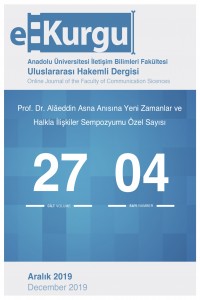POST-TRUTH ÇAĞINDA GERÇEKLERE SADIK KALABİLMEK: HALKLA İLİŞKİLER İÇİN BİR FIRSAT OLARAK MEDYA Ve BİLGİ OKURYAZARLIĞI
Abstract
21. yüzyılın iletişim teknolojilerindeki gelişmelerle şekillenen hızlı iletişim ortamı ve özellikle
sosyal ağlar her tür içeriğin geniş kitlelere yayılmasında önemli bir etkiye sahiptir. Nesnel
gerçeklerden çok duygulara hitap eden haberlerin yayılması da bu sebeple geçmişe göre çok
daha hızlı olmakta ve çok sayıda insana ulaşmaktadır. Alternatif medya anlatılarına, göreceliğe
ve duygusallığa dayanan post-truth çağı, hedef kitleleriyle ilişkilerinde şeffaflığı ve güven
oluşturmayı temel alan halkla ilişkiler disiplini için de yeni mücadeleler getirmektedir. Hedef
kitlelerinde güvene ve gerçeklere dayanan uzun vadeli ilişkiler kurmayı ve sürdürmeyi
amaçlayan halkla ilişkiler gerçeklerin ve güvenin erozyona uğradığı post-truth çağında kendini
ve mesajlarını inanılır kılmayı nasıl başarabilir? Bu sorunun cevabı muhtemelen halkla
ilişkilerin hedef kitlelerinin de bilgiye erişme, erişilen bilgiyi sorgulayıcı bir tutumla analiz etme
ve sonuç olarak doğru ve güvenilir bilgiyle gerçek dışı bilgiyi ayırabilmelerinde yatmaktadır. Bu
çalışma post-truth olarak adlandırılan dönemi ve bu dönemin halkla ilişkiler disiplinin ideal
doğasına aykırı söylemini tartışmaya açmayı ve medya okuryazarlığının hem halkla ilişkilerin
hedef kitleleriyle olan ilişkilerine nasıl bir avantaj sağlayabileceğini hem de bireylere nasıl bir
donanım sağlayabileceğini ortaya koymayı amaçlamaktadır.
References
- Altun, A. (2005) Gelişen Teknolojiler ve Yeni Okuryazarlıklar Ankara: Anı
- Alvermann, D. E. (2017). Social Media Texts and Critical Inquiry in a Post-Factual Era. Journal of Adolescent & Adult Literacy, 61(3), 335-338.
- Auberry, (October 02, 2018). Increasing Students’ Ability To İdentify Fake News Through İnformation Literacy Education And Content Management Systems. The Reference Librarian, 59, 4, 179-187.
- Ball, J. (2018). Post-Truth: How Bullshit Conquered the World. Biteback Publishing.
- Bentzen,N.(2018). Post-truth or Post-trust? http://www.europarl.europa.eu/RegData/etudes/ATAG/2018/628298/EPRS_ATA(2018)628298_EN.pdf
- Bulger, M., Davison, P. (2018) "The Promises, Challenges, and Futures of Media Literacy," Journal of Media Literacy Education, 10(1), 1 -21.
- Chen, D. -T., Wu, J., & Wang, Y. -M. (2011). Unpacking New Media Literacy. Journal of Systemics, Cybernetics and Informatics, 9(2), 84-88.
- Corner, J. (2017). Fake News, Post-Truth And Media–Political Change. Media, Culture & Society, 39(7), 1100–1107. https://doi.org/10.1177/0163443717726743.
- Ewen, S. (1996). PR!: A social history of spin. New York: BasicBooks.
- Grunig, J. E. (2009). Paradigms Of Global Public Relations In An Age Of Digitalisation. PRism 6(2): http://praxis.massey.ac.nz/prism_on-line_journ.html
- Hiebert, R. E. (2005). Commentary: New Technologies, Public Relations, And Democracy. Public Relations Review, 31(1), 1-9.
- Kavanagh, J., Rich,M.D.(2018). Truth Decay: An Initial Exploration of the Diminishing Role of Facts and Analysis in American Public Life. Santa Monica, CA: RAND Corporation. https://www.rand.org/pubs/research_reports/RR2314.html.
- L’Etang J. (2008) Public Relations, Persuasion and Propaganda: Truth, Knowledge, Spirituality and Mystique. In: Zerfass A., van Ruler B., Sriramesh K. (eds) Public Relations Research. VS Verlag für Sozialwissenschaften
- Mandalios, J. (2013). RADAR: An Approach For Helping Students Evaluate Internet Sources. Journal of Information Science, 39(4), 470–478. doi:10.1177/0165551513478889
- McComiskey, B. (2017). Post-Truth Rhetoric And Composition. University Press of Colorado. https://literariness.org/wp-content/uploads/2018/10/Literariness.org-BruceMccomiskey-Post-Truth-Rhetoric-and-Composition-Utah-State-University-Press2017.pdf
- McIntyre, L. C., & Josdal, M. (2018). Post-truth. New York: Gildan
- Schudson, M. (2011). The Sociology Of News. New York: W.W. Norton.
- Weaver, C. K., Motion, J., & Roper, J. (2006). From Propaganda To Discourse (And Back Again): Truth, Power, The Public İnterest And Public Relations. Public relations: Critical debates and contemporary practice, 7-21.
- Yap, A., Snyder, L. G., & Drye, S. (2018). The Information War in the Digital Society: A Conceptual Framework for a Comprehensive Solution to Fake News. Academy of Social Science Journal, 3(7), 1214-1221.
- https://en.oxforddictionaries.com/word-of-the-year/word-of-the-year-2016
- https://dictionary.cambridge.org/dictionary/english/post-truth
- https://www.penguinrandomhouse.ca/books/112830/lies-incorporated-by-ari-rabin-havt-andmedia-matters/9780307279590/excerpt
- http://www.columbia.edu/itc/journalism/j6075/edit/boor.html
- https://www.statista.com/statistics/617136/digital-population-worldwide/
- https://www.medialit.org/reading-room/what-media-literacy-definitionand-more
- https://davidbuckingham.net/2017/01/12/fake-news-is-media-literacy-the-answer/#more-626
- https://www.theguardian.com/media/2016/jul/12/how-technology-disrupted-the-truth
Details
| Primary Language | Turkish |
|---|---|
| Subjects | Communication and Media Studies |
| Journal Section | Research Articles |
| Authors | |
| Publication Date | December 30, 2019 |
| Published in Issue | Year 2019 Volume: 27 Issue: 4 |

